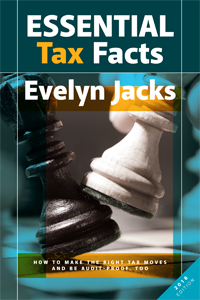CRA Carrying Charges: What’s Tax Deductible?

Last week we discussed the deductibility of interest and penalties levied by the Canada Revenue Agency. In Part two of this series, we’re taking a closer look at the deductibility of interest costs on your investments.
What’s deductible. The difference between good and bad debt often lies in its tax deductibility. Carrying charges, such as interest expenses may be deducted when there is a potential to earn investment income from property: interest, dividends, rents and royalties. Here is a checklist of common deductible expenditures:
Checklist of Deductible Carrying Charges
-
Accounting fees relating to the preparation of tax schedules for investment income reporting.
-
Investment counsel fees. These do not include commissions paid on buying or selling investments. These commissions form part of the adjusted cost base of the investment or reduce proceeds of disposition from the investment on Schedule 3.
-
Taxable benefits reported on the T4 Slip for employer-provided loans that were used for investment purposes. (Again, often missed: ask your tax specialist about this if you have been fortunate enough to receive this perk of employment)
-
Life insurance policy interest costs if an investment loan was taken against cash values. Complete form T2210 Verification of Policy Loan Interest by Insurer to justify the claim.
-
Management or safe custody fees (but not a bank safety deposit box, which is no longer tax deductible after 2013).
-
Interest paid on investment loans if there is a reasonable expectation of income from the investment, even if the value of the investment has diminished.
For this reason, these investment expenses are often audited. You must, therefore, be prepared to trace all interest you have claimed back to a non-registered investment that has the potential to earn income. It makes sense to make all the right tax moves, in other words, but to be audit-proof, too.
Diminished Value in Assets. Have your assets diminished in value since you acquired them with a loan? Will your interest still be deductible in that case? The answer is yes. You can continue to deduct the interest until the loan is fully repaid, even if you sell the assets. If you did not use the proceeds to pay down the loan, then you can deduct only the portion of interest that would have been paid had you done so.
Next time: CRA Carrying Charges: What’s Not Deductible?
Excerpted from Evelyn Jacks’ new Essential Tax Facts: How to Make the Right Tax Moves and Be Audit-proof, Too. Available now!
COPYRIGHT OWNED BY KNOWLEDGE BUREAU INC. 2018.
UNAUTHORIZED REPRODUCTION, IN WHOLE OR IN PART, IS PROHIBITED.
 |
 |
 |
 |
|
Refer a Friend |
Research |
Calculators |
Course Trials |
 |
 |
 |
 |